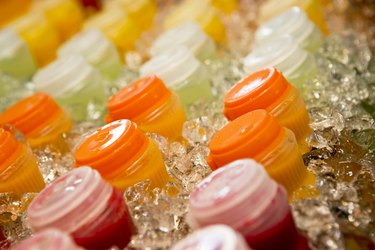
Electrolyte replacement drinks contain ingredients intended to sustain optimal physical performance and prevent dehydration in people engaged in intense exercise. To accomplish the job, these drinks are a mix of water, carbohydrates for energy and electrolytes such as sodium, which are lost due to excessive sweating. While these drinks are beneficial when you need the nutrients, the extra sugar and sodium can lead to problems if you drink too much or consume sports drinks instead of water.
Consume Too Many Calories
Video of the Day
After an hour of exercise, you need to replenish carbohydrates to supply fuel for your muscles. Electrolyte drinks designed to meet this goal contain carbs in the form of sugars, such as glucose, sucrose and fructose, which also deliver calories. Sports drinks should contain 60 to 80 calories in carbs per 1-cup serving, according to a report from the National Strength and Conditioning Association. Check the nutrition label because the amount of carbs vary depending on the brand. If you drink electrolyte replacements when you're not burning the extra carbs, these calories may contribute to weight gain.
Video of the Day
Blood Sugar Concerns
The carbohydrates in electrolyte replacement drinks pose another problem: They have a high glycemic score, which means they cause a significant spike in blood sugar. If you're healthy and drink a moderate amount, your body will get blood sugar levels back to normal without a problem. But if you have pre-diabetes or diabetes, drinking too many electrolyte replacement drinks will interfere with maintaining a healthy and balanced level of blood sugar.
Exceed Healthy Sodium Levels
Sodium is an electrolyte that regulates the volume of blood in your body that helps keep your muscles, nerves and heart working. When you sweat, sodium is also excreted, so you may need to replace it when you sweat more than normal. But getting too much sodium from electrolyte replacement drinks may raise your blood pressure. Sports drinks contain different amounts, but may have as much as 252 milligrams of sodium in 1 cup, according to the U.S. Department of Agriculture. This amount represents 17 percent of the recommended daily intake for sodium -- 1,500 milligrams -- established by the Institute of Medicine. Keep your sodium intake in check by avoiding processed foods, especially on the day you drink electrolyte replacement drinks.
Erode Tooth Enamel
Some brands of sports drinks contain citric acid, which adds a tart flavor. On a scale where zero represents a strong acid and seven is neutral, two brand name sports beverages have scores of 3 and 4. This is about the same level of acidity as vinegar. The problem is that citric acid erodes tooth enamel, which can lead to cavities if you drink too often. When researchers at the University of Tennessee compared an electrolyte replacement to carbonated cola, they found that the sports drink dissolved more tooth enamel than the soda, according to a study in the "Journal of Contemporary Dental practice" in November 2007.
- National Strength and Conditioning Association: Avoid Sports Beverage Blunders: Which One is Right for You?
- Sports Dietitians Australia: The Glycemic Index and Sports Performance
- USDA National Nutrient Database: Fluid Replacement, Electrolyte Solution (Include Pedialyte)
- Urological Research: Effect of Two Sports Drinks on Urinary Lithogenicity
- Elmhurst College: pH Scale
- Journal of Contemporary Dental Practice: The Erosive Potential of Soft Drinks on Enamel Surface Substrate: An in Vitro Scanning Electron Microscopy Investigation
- Linus Pauling Institute: Sodium